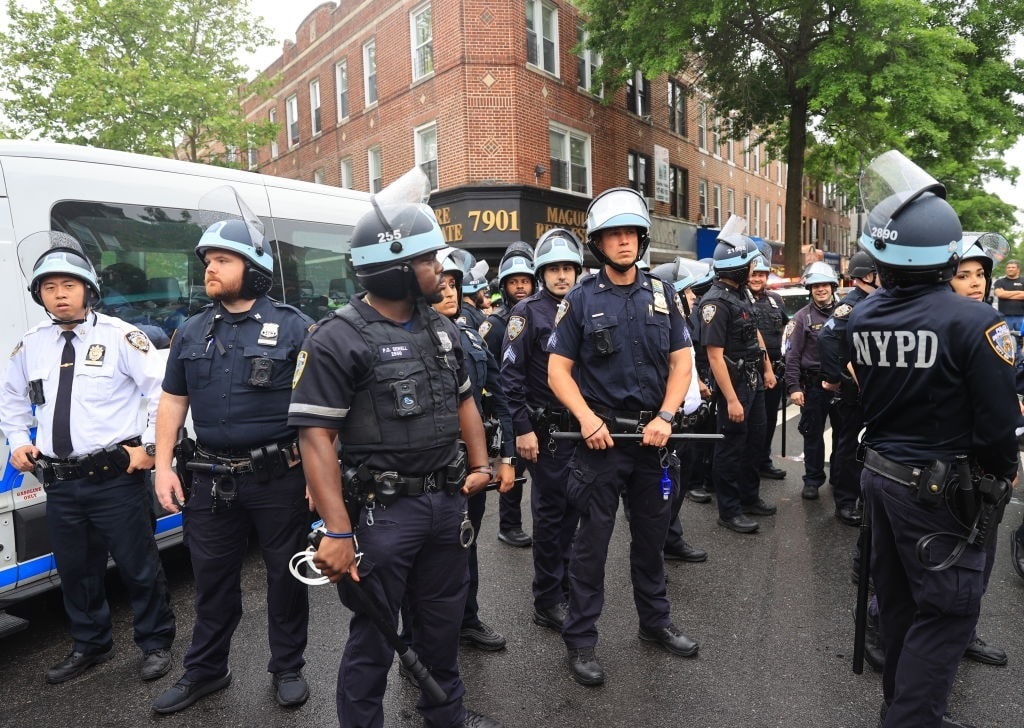New York City is no stranger to crisis. The Big Apple has a homeless problem, rising crime, and illegal immigration issues, to name some of the top concerns for citizens. A recent poll showed the majority of survey takers blame the rise in crime on the surge of migrants, and, to make matters worse, the city’s police officers are leaving the force in record numbers.
NY Police Officers Leaving the Force
The number of cops on the job last year and this year is at the lowest in more than three decades, according to data obtained by the New York Post. In fact, about 200 leave each month.
 Stats from the City of New York Police Department show 33,695 current police officers for a population of 8,335,897. While that is 154 more than last year, it is the lowest since 1990, when there were 32,451 on duty. Last year, from January through April, 508 cops quit, but for the same time frame this year, 566 have left. Even though retirements surged this year, with 11% so far, 257 cops quit before they reached 20 years on the job, the time required to receive a full pension. Twenty-seven resigned on May 16 alone.
Stats from the City of New York Police Department show 33,695 current police officers for a population of 8,335,897. While that is 154 more than last year, it is the lowest since 1990, when there were 32,451 on duty. Last year, from January through April, 508 cops quit, but for the same time frame this year, 566 have left. Even though retirements surged this year, with 11% so far, 257 cops quit before they reached 20 years on the job, the time required to receive a full pension. Twenty-seven resigned on May 16 alone.
Why are so many police officers leaving the force? Police Benevolent Association President Patrick Hendry told The Post that “New York City police officers’ workload has exploded over the past several months, and the staffing is still nowhere close to keeping up.” He added:
“From the daily protest details to additional patrols in the subway, our members are beyond exhausted already – and summertime crime spikes are just around the corner. Squeezing cops for even more overtime hours is not a solution. It will just send even more of them running for the exits.”
Police in NYC, on average, handle about 12 protests a day and often work past the end of their shift to deal with the protesters. Since October 7, NYPD has responded to 2,400 protests, The Post explained.
Referred to only as John, a 42-year-old police officer assigned to the Bronx told The Post: “When I first got on the job, there was a certain level of respect for the police officer. In regards to no-bail, these guys know they can punch a cop and be let out the next day. There’s no consequences. So, a lot of cops are like, ‘What the hell are we doing?’”
In March, Queens Councilman Robert Holden told the outlet: “People are fed up with the quality of life. There’s a general sense of lawlessness. You go into the CVS and there’s shoplifting. People’s cars get vandalized. There’s general disrespect for the police.”
Mayor Eric Adams canceled from the budget five classes that would have trained new recruits in order to help offset the cost of migrants surging into New York City. Earlier this year, he was able to bring back one of the classes, but that still leaves a gross shortage of fully trained police officers.
Law Enforcement Shortage Across the Nation
New York City isn’t the only place suffering a shortage of law enforcement; it’s happening across the nation, especially in Democrat-run states where defunding the police became a top priority during the riots of 2020. Seattle, WA, has lost more than 700 officers in the past five years and is “at its lowest staffing level since the 1990s,” K5 News reported in March. “We’re already at critical levels,” added Police Chief Adrian Diaz.
Left with a police shortage, cities have been trying different recruitment incentives. Philadelphia’s department lowered the requirements for the physical exam; Los Angeles is offering housing subsidies; and Washington, DC, is handing out signing bonuses of more than $20,000. Across the nation, the effort to rebuild battered law enforcement numbers has departments offering all kinds of inducements; some are considering changing policies on tattoos and previous drug use that used to prevent some from joining the force. Others have changed the minimum age to become a police officer to 18, and several states have even expanded eligibility to illegal migrants.
But is the damage already beyond repair? Police1’s “What cops want in 2023” survey demonstrated just how damaging the so-called reform of the past few years has been. When asked to identify the least satisfying aspects of their job, the top five responses paint a clear picture:
- The presumption that the police are always wrong
- Negative comments from citizens
- Media spotlight, presumably negative
- Attention from politicians, presumably negative
- Serving a community that doesn’t appreciate the police
One of the respondents summarized his thoughts, saying: “I used to love the job, but all the negativity surrounding the profession has really taken a toll. Especially, because it is vastly unwarranted. Police officers are being used as political pawns and many falsehoods have been put forth and accepted by many as truths.” Police1 warned: “For perhaps the first time in the history of American law enforcement we may be witnessing a ‘lost generation’ of policing.”




